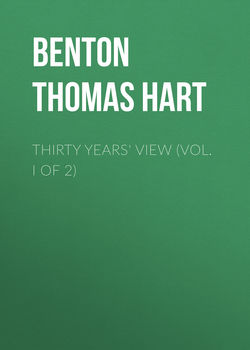Читать книгу Thirty Years' View (Vol. I of 2) - Benton Thomas Hart - Страница 12
CHAPTER IX.
ABOLITION OF THE INDIAN FACTORY SYSTEM
ОглавлениеThe experience of the Indian factory system, is an illustration of the unfitness of the federal government to carry on any system of trade, the liability of the benevolent designs of the government to be abused, and the difficulty of detecting and redressing abuses in the management of our Indian affairs. This system originated in the year 1796, under the recommendation of President Washington, and was intended to counteract the influence of the British traders, then allowed to trade with the Indians of the United States within our limits; also to protect the Indians from impositions from our own traders, and for that purpose to sell them goods at cost and carriage, and receive their furs and peltries at fair and liberal prices; and which being sold on account of the United States, would defray the expenses of the establishment, and preserve the capital undiminished – to be returned to the treasury at the end of the experiment. The goods were purchased at the expense of the United States – the superintendent and factors were paid out of the treasury, and the whole system was to be one of favor and benevolence to the Indians, guarded by the usual amount of bonds and oaths prescribed by custom in such cases. Being an experiment, it was first established by a temporary act, limited to two years – the usual way in which equivocal measures get a foothold in legislation. It was soon suspected that this system did not work as disinterestedly as had been expected – that it was of no benefit to the Indians – no counteraction to British traders – an injury to our own fur trade – and a loss to the United States; and many attempts were made to get rid of it, but in vain. It was kept up by continued temporary renewals for a quarter of a century – from 1796 to 1822 – the name of Washington being always invoked to continue abuses which he would have been the first to repress and punish. As a citizen of a frontier State, I had seen the working of the system – seen its inside working, and knew its operation to be entirely contrary to the benevolent designs of its projectors. I communicated all this, soon after my admission to a seat in the Senate, to Mr. Calhoun, the Secretary at War, to whose department the supervision of this branch of service belonged, and proposed to him the abolition of the system; but he had too good an opinion of the superintendent (then Mr. Thomas L. McKinney), to believe that any thing was wrong in the business, and refused his countenance to my proposition. Confident that I was right, I determined to bring the question before the Senate – did so – brought in a bill to abolish the factories, and throw open the fur trade to individual enterprise, and supported the bill with all the facts and reasons of which I was master. The bill was carried through both Houses, and became a law; but not without the strenuous opposition which the attack of every abuse for ever encounters – not that any member favored the abuse, but that those interested in it were vigilant and active, visiting the members who would permit such visits, furnishing them with adverse statements, lauding the operation of the system, and constantly lugging in the name of Washington as its author. When the system was closed up, and the inside of it seen, and the balance struck, it was found how true all the representations were which had been made against it. The Indians had been imposed upon in the quality and prices of the goods sold them; a general trade had been carried on with the whites as well as with the Indians; large per centums had been charged upon every thing sold; and the total capital of three hundred thousand dollars was lost and gone. It was a loss which, at that time (1822), was considered large, but now (1850) would be considered small; but its history still has its uses, in showing how differently from its theory a well intended act may operate – how long the Indians and the government may be cheated without knowing it – and how difficult it is to get a bad law discontinued (where there is an interest in keeping it up), even though first adopted as a temporary measure, and as a mere experiment. It cost me a strenuous exertion – much labor in collecting facts, and much speaking in laying them before the Senate – to get this two years' law discontinued, after twenty-five years of injurious operation and costly experience. Of all the branches of our service, that of the Indian affairs is most liable to abuse, and its abuses the most difficult of detection.
